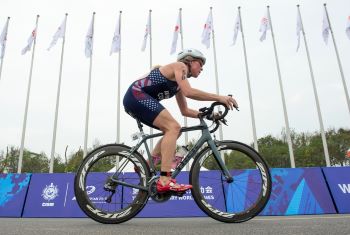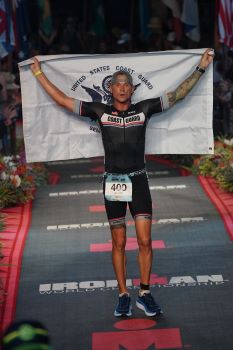Ultra-Endurance Military Athletes: What Motivates Them?
 U.S. Coast Guard Lt. Cmdr. Duane Zitta competes in the most extreme endurance events in support of the Coast Guard Foundation. In June, he completed a 12-peak challenge in 23 hours, climbing to the top of Alaska’s 12 tallest Chugach Front Range summits – each more than 5,000 feet above sea level – in one continuous push, covering more than 39 miles and gaining over 19,000 feet in elevation (Courtesy of Coast Guard Lt. Cmdr. Duane Zitta).
U.S. Coast Guard Lt. Cmdr. Duane Zitta competes in the most extreme endurance events in support of the Coast Guard Foundation. In June, he completed a 12-peak challenge in 23 hours, climbing to the top of Alaska’s 12 tallest Chugach Front Range summits – each more than 5,000 feet above sea level – in one continuous push, covering more than 39 miles and gaining over 19,000 feet in elevation (Courtesy of Coast Guard Lt. Cmdr. Duane Zitta).
For some, sports are simply a way to stay fit, for others a way to de-stress. But for endurance athletes - who push themselves to go faster and longer for events such as marathons, cycling races, cross-country skiing, triathlons, and long-course swimming - it's a mental and physical challenge with themselves.
Such is the case of Coast Guard Lt. Cmdr. Duane Zitta, intelligence chief for Sector Anchorage, on Joint Base Elmendorf-Richardson in Alaska. Zitta has embarked on the world's most extreme endurance events ever since he ran his first marathon at age 23 just "to see" if he could run that far. (He completed it in just over three hours -- 3:09 to be exact - which is a far better time than the average marathoner, who takes about 4.5 hours).
For Zitta, endurance sports began as a way to let his energy out.
"When I was young, running was always something that I enjoyed," he said. "It was an outlet for me, I was a super hyperactive kid with a lot of energy. And running was a way to get that energy out."
Later in life, it became a way to give back to the Coast Guard community. After losing a fellow Coastguardsman during a helicopter search-and-rescue operation, these ultra-endurance events became a way to raise funds for his colleague's children.
Since then, he's competed in high-profile events to raise funds for the non-profit Coast Guard Foundation, which provides college scholarships for the children of fallen "Coasties."
Competing in extreme endurance events "for fundraisers that have such a personal connection for me also made some of the hardest events so much easier," he said.
"When your body wants to quit and you remind yourself that you're out here raising money for somebody's children to go to college and they're not around anymore, that motivation makes any of these endurance events that much easier."
He's completed many events that others would deem impossible. The list includes climbing 12 back-to-back mountain peaks in Alaska in less than 24 hours; completing several Ironman triathlons, including the competitive Hawaii Ironman World Championship triathlon; swimming 12.5-miles around Key West in six hours; climbing 10,000 feet across 20 miles from sea level to the top of the Haleakala Volcano in Hawaii; and finishing one of the most grueling 100-mile races in eighth place overall.
And on every birthday, he runs the distance (in miles) that corresponds to his age -- just for fun. This November, he will run 41 miles in Anchorage's snowy terrain and sub-freezing temperatures.
 U.S. Air Force Maj. Judith Coyle of the U.S. Armed Forces Triathlon races a bicycle on her way to win gold in the 2019 CISM Military World Games in Wuhan, China, Oct. 26, 2019 (Photo by: EJ Hersom, DOD).
U.S. Air Force Maj. Judith Coyle of the U.S. Armed Forces Triathlon races a bicycle on her way to win gold in the 2019 CISM Military World Games in Wuhan, China, Oct. 26, 2019 (Photo by: EJ Hersom, DOD).
"Running is so primitive," he said. "It's like the simplest form of movement, and we were designed to do that."
Extreme athletes can be found across the military, which is a career field that can appeal to these athletes. Some service members also find that preparing for competitive events can dovetail well with other military training programs.
"Due to the extreme nature of their career and previous experiences in combat deployments, many service members enjoy high-risk, challenging and thrilling activities," said Nicole Leth, a certified personal trainer, health educator, and director of the Armed Forces Wellness Center in Ft. Belvoir, Virginia.
"Training for these events brings structure to workouts."
Getting there is a balancing act
Training for ultra-events like these takes extreme dedication, discipline, commitment, and proper training - which includes incremental training, rest, recovery, and proper nutrition.
It also carries risks, like overtraining, misguided supplement use, burnout, malnutrition, and overuse injuries, Leth said.
Most injuries are due to overuse. "Mostly tendinitis, joint pain, and stress fractures," Leth said. "I would also say mental fatigue and reported poor mental health."
That's why it's key to follow a research-based training plan from an experienced coach that includes rest and recovery.
"Programming rest and recovery days into your regimen will reduce symptoms of overtraining and allow muscles to rebuild as long as proper nutrition is in place," said Navy Lt. Sarah Alferos, a physical therapist with the Physical Therapy/Sports Medicine and Rehabilitation Team at Navy Medicine Readiness and Training Command Pearl Harbor in Hawaii.
Athletes can find training support through the Military Health System.
 In another ultra-event, Coast Guard Lt. Cmdr. Duane Zitta completed the 2019 Ironman World Championships in Kona, Hawaii, in 11 hours, 10 minutes, and 14 seconds. The race consists of a 2.4-mile open-water swim, a 112-mile bike ride, and a marathon (26.2 miles) run (Courtesy of Coast Guard Lt. Cmdr. Duane Zitta).
In another ultra-event, Coast Guard Lt. Cmdr. Duane Zitta completed the 2019 Ironman World Championships in Kona, Hawaii, in 11 hours, 10 minutes, and 14 seconds. The race consists of a 2.4-mile open-water swim, a 112-mile bike ride, and a marathon (26.2 miles) run (Courtesy of Coast Guard Lt. Cmdr. Duane Zitta).
"The Wellness Center staff are able to guide service members to reputable, evidence-based resources for training and would cover healthy exercise, eating habits, sleep and stress management in accordance with the individuals' needs along with performance fueling information," said Leth.
Registered dietitians at military medical treatment facilities can offer dietary guidelines for training and performance fueling.
Proper gear, like wearing the right shoes, bringing a headlamp or reflective vest for oncoming traffic, and proper hydration and nutrition, is also key. Whether you have a support crew ensuring you have these along the course or carry them with you in a fuel belt or pack, experts recommend training over time with everything you will wear and consume on race day to avoid surprises.
"Every company creates different types of shoes depending on your foot type, whether you need a neutral shoe due to a high arch, or a stability shoe due to low arches," said Alferos. "Visit a local shoe store and have them identify your arch type and toe box preference, assess your running form, and recommend an individual shoe for your foot."
Zitta appreciates having access to proper care through his primary care manger. He also has a coach who "keeps him in check." And over his years of ultra-endurance events, Zitta has only suffered one injury that set him back.
"It was a stress fracture just below my knee and my tibia," due to "just ramping up the training too quick one year. But I have been really fortunate to remain healthy over the last decade of competing."
To prepare, he explained he tailors his life around every specific event, not only in terms of training but also nutrition and balancing his time between work and family.
"Everything shifts in preparation for that specific event," he said. "If it's a running event, then obviously all my training will be primarily focused on running, and as training intensity ramps up, then so does the intensity of my kitchen prep - food is very important."
In general, the lessons learned over the years have allowed him to "become really good at balancing the time it takes for me to invest in events of this nature," he said. "But now, my time with my family is more important to me than any event ever could be."
Over the years, Zitta has grown to enjoy the comradery among the other athletes who compete in these elite events.
"The endurance community is extremely special," he said. "Whether you're doing Ironmans, or ultra-marathons, or ultra-swims, the people are all so genuine and welcoming, and generally pretty happy, so I've learned a lot from the people in these communities."
He believes the human body is a tool that is never used to its full potential. "But there is something special with endurance athletes, somehow, through time, they're able to train their minds to go further."
"Once people work on being in tune with themselves, in their mind and their body, the possibilities are endless."
"I mean, people are running 240-mile races now with no sleep," he said. "So, to me, that indicates that the potential for the human body and the human brain are far beyond what a lot of people realize."